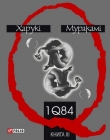
Текст книги "1q84"
Автор книги: Haruki Murakami
Жанр:
Современная проза
сообщить о нарушении
Текущая страница: 44 (всего у книги 81 страниц)
Fuka-Eri gave her head a little shake. “I have stuff to think about.”
Tengo wanted to ask Fuka-Eri about what had happened between them during the thunderstorm. Why did you do that? He couldn’t believe that Fuka-Eri had any sexual desire for him. It must have been an act that somehow took shape unconnected with sex. If so, what possible meaning could it have had?
Even if he asked her about it outright, though, he doubted he would receive a straight answer. And Tengo couldn’t quite bring himself to broach a subject like that directly on such a peaceful, quiet September evening. It was an act that had been performed in hiding at a dark hour in a dark place in the midst of a raging thunderstorm. Brought out into everyday circumstances, the nature of its meaning might change.
So Tengo approached the question from a different angle, one that admitted a simple yes-or-no answer. “You don’t have periods?”
“No” was Fuka-Eri’s curt reply.
“You’ve never had even one?”
“No, not even one.”
“This may be none of my business, but you’re seventeen years old. It’s probably not normal that you’ve never had a period.”
Fuka-Eri gave a little shrug.
“Have you seen a doctor about it?”
Fuka-Eri shook her head. “It wouldn’t do any good.”
“Why wouldn’t it do any good?”
Fuka-Eri did not answer. She gave no sign that she had even heard the question. Maybe her ears had a special valve that sensed a question’s appropriateness or inappropriateness, opening and closing as needed, like a mermaid’s gills.
“Are the Little People involved in this, too?” Tengo asked.
Again no answer.
Tengo sighed. He couldn’t think of anything else to ask that would enable him to approach a clarification of last night’s events. The narrow, uncertain path gave out at that point, and only a deep forest lay ahead. He checked his footing, scanned his surroundings, and looked up to the heavens. This was always the problem with talking to Fuka-Eri. All roads inevitably gave out. A Gilyak might be able to continue on even after the road ended, but for Tengo it was impossible.
Instead he brought up a new subject. “I’m looking for a certain person,” he said. “A woman.”
There was no point in talking about this to Fuka-Eri. Tengo was fully aware of that. But he wanted to talk about it to someone. He wanted to hear himself telling someone—anyone—what he was thinking about Aomame. Unless he did so, he felt Aomame would grow even more distant from him.
“I haven’t seen her for twenty years. I was ten when I last saw her. She and I are the same age. We were in the same class in elementary school. I’ve tried different ways of finding her without any luck.”
The record ended. Fuka-Eri lifted it from the turntable, narrowed her eyes, and sniffed the vinyl a few times. Then, handling it carefully by the edges so as not to leave fingerprints on it, she slipped it into its paper envelope and slid the envelope into the record jacket—gently, lovingly, like transferring a sleeping kitten to its bed.
“You want to see this person,” Fuka-Eri asked without a question mark.
“Yes, she is very important to me.”
“Have you been looking for her for twenty years,” Fuka-Eri asked.
“No, I haven’t,” Tengo said. While searching for the proper words to continue, Tengo folded his hands on the table. “To tell you the truth, I just started looking for her today.”
“Today,” she said.
“If she’s so important to you, why have you never looked for her until today?” Tengo asked for Fuka-Eri. “Good question.”
Fuka-Eri looked at him in silence.
Tengo put his thoughts into some kind of order. Then he said, “I’ve probably been taking a long detour. This girl named Aomame has been—how should I put this?—at the center of my consciousness all this time without a break. She has functioned as an important anchor to my very existence. In spite of that fact—is it?—I guess I haven’t been able to fully grasp her significance to me precisely because she has been all too close to the center.”
Fuka-Eri stared at Tengo. It was impossible to tell from her expression whether this young girl had the slightest comprehension of what he was saying. But that hardly mattered. Tengo was half talking to himself.
“But it has finally hit me: she is neither a concept nor a symbol nor a metaphor. She actually exists: she has warm flesh and a spirit that moves. I never should have lost sight of that warmth and that movement. It took me twenty years to understand something so obvious. It always takes me a while to think of things, but this is a little too much. It may already be too late. But one way or another, I want to find her.”
With her knees on the floor, Fuka-Eri straightened up, the shape of her nipples showing through the Jeff Beck T-shirt.
“Ah-oh-mah-meh,” Fuka-Eri said slowly, as if pondering each syllable.
“Yes. Green Peas. It’s an unusual name.”
“You want to meet her,” Fuka-Eri asked without a question mark.
“Yes, of course I want to meet her,” Tengo said.
Fuka-Eri chewed her lower lip as she took a moment to think about something. Then she looked up as if she had hit upon a new idea and said, “She might be very close by.”
CHAPTER 17
Aomame
PULL THE RAT OUT
The seven a.m. television news carried a big report on the Akasaka-Mitsuke subway station’s flooding, but there was no mention of the death of Sakigake’s Leader in a suite at the Hotel Okura. When NHK’s news ended, Aomame switched channels and watched the news on a few other channels, but none of them announced that large man’s painless death.
They hid his body, Aomame thought, scowling. Tamaru had predicted such a possibility, but she had found it hard to believe that they would actually do it. Somehow they had managed to carry Leader’s corpse from the Hotel Okura suite, load it into a car, and take it away. He was a big man, and the corpse must have been tremendously heavy. The hotel was full of guests and employees. Security cameras were everywhere. How had they succeeded in carrying the corpse to the hotel’s underground parking lot without having anyone notice?
They must have transported the body at night to the headquarters in Yamanashi and then held a discussion of what to do with it. At least they were not going to formally report his death to the police. Once you’ve hidden something, you have to keep it hidden.
Aomame, of course, had no idea how they intended to fill the vacuum created by Leader’s death. But they would exhaust every means available to them to maintain the organization. As the man himself had said, the system would endure with or without a leader. Who could inherit Leader’s mantle? That problem had nothing to do with Aomame. Her assignment had been to liquidate Leader, not to crush a religion.
She thought about the two bodyguards in their dark suits. Buzzcut and Ponytail. When they got back to headquarters, would they be held responsible for having allowed Leader to be wiped out before their very eyes? Aomame imagined their next assignment: “Find that woman, no matter what. Don’t come back here until you do.” It was possible.
She ate an apple for breakfast, but she had almost no appetite. Her hands still retained the sensation of driving the needle into the back of the man’s neck. While peeling the apple with a small knife in her right hand, she felt a slight trembling in her body—a trembling she had never experienced before. When she had killed someone in the past, the memory of it had nearly faded after a night’s sleep. Though it never felt good to take a person’s life, those were all men who didn’t deserve to go on living. They inspired more disgust than human pity. But this time was different. Objectively, what this man had been doing was perhaps an affront to humanity. But he himself was, in many senses, an extraordinary human being, and his extraordinariness, at least in part, appeared to transcend standards of good and evil. Ending his life had also been something extraordinary. It had left a strange kind of resonance in her hands—an extraordinary resonance.
What he had left behind was a “promise.” This was the conclusion to which Aomame’s thoughts led her. The weight of that promise was left in her hands as a sign. She understood this. The sign might not fade from her hands—ever.
The phone rang shortly after nine a.m. It was Tamaru. It rang three times, stopped, and started again twenty seconds later.
“They didn’t call the police after all,” Tamaru said. “It’s not on the TV news or in the paper.”
“He did die, though. I’m sure of that.”
“Yes, of course, I know. No question he died. There were a few movements around there. They’ve already cleared out of the hotel. They called in several people from their city branch office in the middle of the night, probably to help deal with the body. They’re good at things like that. Around one a.m., an S-Class Mercedes and a Toyota Hiace van left the hotel parking lot. Both had dark glass and Yamanashi plates. They were probably back in Sakigake headquarters by sunrise. The police investigated the compound the day before yesterday, but it wasn’t a full-scale operation, and all the officers were long gone by then. Sakigake has a big incinerator. If you threw a body in there, it wouldn’t leave a bone, just clean smoke.”
“Creepy.”
“They’re a creepy bunch, all right. Even if their Leader is dead, the organization will keep moving for a while, like a snake that keeps going even after its head is cut off. Head on or off, it knows exactly where it’s headed. Nobody can say what will happen in the future. It might die. Or grow a new head.”
“He was no ordinary man.”
Tamaru offered no opinion on that matter.
“Completely different from the others,” Aomame said.
Tamaru took a moment to gauge the resonance of her words. Then he said, “Yes, I can imagine this was different from the others. But we’d better start thinking about what happens from now on, and be a little more practical. Otherwise you won’t be able to survive.”
Aomame thought she should say something, but the words would not come. The trembling was still there in her body.
“Madame tells me she wants to talk to you,” Tamaru said. “Can you talk?”
“Of course,” Aomame said.
The dowager took the phone. Aomame could sense relief in her voice.
“I am so grateful to you, more than I can ever say. You handled this one perfectly.”
“Thank you very much. But I don’t think I’ll be able to do it again,” Aomame said.
“No, I realize that. We asked too much of you. I’m so happy you’re all right. We won’t be asking you to do this anymore. This was the last time. We have prepared a place for you to settle into. You won’t have to worry about a thing. Just lie low for a while in the safe house. In the meantime, we’ll make arrangements for you to move into your new life.”
Aomame thanked her.
“Do you have everything you need there? If not, let us know. I’ll have Tamaru take care of it right away.”
“No, thank you. As far as I can tell, everything I need is here.”
The dowager lightly cleared her throat. “Now, this is something I want you to keep in mind. What we did was absolutely right. We punished the man for his crimes and prevented him from committing any more. There will be no more victims. We put a stop to that. You must not let this bother you.”
“He said the same thing.”
“ ‘He’?”
“Sakigake’s Leader. The man I took care of last night.”
The dowager remained silent for a full five seconds. Then she said, “He knew?”
“Yes, he knew I was there to take care of him, and still he let me in. He was, if anything, hoping for death. His body had already suffered serious injury and was heading toward a slow but inevitable end. All I did was speed up the process somewhat and provide relief to a body tortured by intense pain.”
The dowager seemed seriously shocked to hear this. Again she was at a loss for words, something most unusual for her.
“You mean to say—” the dowager said, looking for the right words, “that he himself was hoping for punishment for his deeds?”
“What he wanted was to end his painful life as soon as possible.”
“And he made up his mind to let you kill him.”
“Exactly.”
Aomame said nothing about the bargain she had struck with Leader. In exchange for letting Tengo go on living in this world, she herself would have to die: this was an agreement known only to Aomame and the man. No one else was to be told.
Aomame said, “The things he did were deviant and deserving of death, but he was no ordinary human being. Or at least he possessed something special.”
“Something special?” the dowager said.
“It’s hard to explain,” Aomame said. “It was at the same time both a special power or gift and a cruel burden. It was, I think, eating him alive from the inside.”
“Could it be that this special something urged him on toward his deviant behavior?”
“Probably.”
“In any case, you put a stop to it.”
“That is true,” Aomame said, her voice dry.
Holding the receiver in her left hand, Aomame spread out her right hand, with its lingering sensation of death, and stared at the palm. What did it mean to “have ambiguous congress” with those girls? Aomame could neither understand it nor explain it to the dowager.
“As always, I made the death appear to have been a natural one, but they will probably not do us the favor of seeing it that way. Given the circumstances, I’m sure they will conclude that I had something to do with it. And as you know, his death has not been reported to the police yet.”
“Whatever steps they choose to take, we will do everything in our power to protect you,” the dowager said. “They have their organization, but we have strong connections and ample funds. Also, you are a careful, intelligent person. We won’t let them have their way.”
“Have you not yet found Tsubasa?” Aomame asked.
“We still don’t know where she went. My thought is that she is in the Sakigake compound. She has nowhere else to go. We haven’t found a way to bring her back yet, but I suspect that Leader’s death has put the group into a state of confusion. We may be able to do something to exploit that confusion in order to save her. That child must be protected.”
That child in the safe house was not actual substance, according to Leader. She was merely one form of a concept and had since been “retrieved.” But Aomame could hardly say this to the dowager now. Aomame herself did not know what it meant. She did, however, remember the levitation of the marble clock. She had seen it happen with her own eyes.
Aomame asked, “How many days will I be hiding out in this safe house?”
“You should assume it will be from four days to a week. After that you will be given a new name and situation and moved to a faraway place. Once you have settled down there, we will have to cut off all contact with you for your own safety. I won’t be able to see you for a while. Considering my age, I might never be able to see you again. It might have been better if I had never lured you into this troublesome business. I have thought about that many times. Then I would not have had to lose you this way. But—”
The dowager’s voice caught in her throat. Aomame waited quietly for her to continue speaking.
“But I have no regrets. Everything was more or less destined to happen. I had to involve you. I had no choice. A very strong force was at work, and that is what has moved me. Still, I feel bad for you that it has come to this.”
“On the other hand, we have shared something, something important, something we could not have shared with anyone else, something we could not have had any other way.”
“Yes, you are right,” the dowager said.
“Sharing it was something that I needed, too.”
“Thank you for saying that. It gives me a measure of salvation.”
Aomame was also pained to think that she could no longer see the dowager, who was one of the few ties she possessed with the outside world.
“Be well,” Aomame said.
“You, too,” the dowager said. “And be happy.”
“If possible,” Aomame said. Happiness was one of the farthest things away from her.
Tamaru came on the phone.
“You haven’t used it so far, have you?” he asked.
“No, not yet.”
“Try your best not to use it.”
“I’ll keep that in mind.”
After a momentary pause, Tamaru said, “I think I told you the other day that I grew up in an orphanage in the mountains of Hokkaido.”
“You were put in there after you were evacuated from Sakhalin when you were separated from your parents.”
“There was a boy in that orphanage two years younger than I was. He was mixed: half Japanese, half black. I think his father was a soldier from the American base in Misawa. I don’t know about his mother, but she was probably a prostitute or a bar hostess. She abandoned him soon after he was born, and he was put in the orphanage. He was a lot bigger than me, but not very smart. The other kids teased him, of course, mainly because his color was different. You know how that goes.”
“I guess.”
“I wasn’t Japanese, either, so it fell to me one way or another to be his protector. Our situations were similar—a Korean evacuee and the illegitimate mixed-race kid of a black guy and a whore. You can’t get much lower than that. But it did me good: it toughened me up. Not him, though. He could never be tough. Left on his own, he would have died for sure. In that place, you had to have a quick wit or be a tough fighter if you wanted to survive.”
Aomame waited quietly for him to go on.
“He was bad at everything. He couldn’t do anything right. He couldn’t button his own shirt or wipe his ass. Carving, though, was something else. He was great at that. Give him a few carving tools and a block of wood and before you knew it he had made a really fine carving. No sketches or anything: the image would pop into his head and he would produce an accurate three-dimensional figure, tremendously detailed and realistic. He was a kind of genius. It was amazing.”
“A savant,” Aomame said.
“Yes, sure. I learned about that stuff later, the so-called savant syndrome. People with extraordinary powers. But nobody knew about that back then. People assumed he was mentally retarded or something—a kid with a slow brain but gifted hands that made him good at carving. For some reason, though, the only thing he would ever carve was rats. He could do those beautifully. They looked alive from any angle. But he never, ever carved anything but rats. Everybody would urge him to carve some other animal—a horse or a bear—and they even took him to the zoo for that purpose, but he never showed the slightest interest in other creatures. So then they just gave up and let him have his way, making nothing but rats. He made rats of every shape and size and pose. It was strange, I guess. By which I mean that there weren’t any rats in the orphanage. It was too cold there, and there was nothing for them to eat. The place was too poor even for rats. Nobody could figure out why he was so fixated on rats.… Well, anyway, word got out about the rats he was making. The local paper carried a story, and people started asking to buy them. The head of the orphanage, a Catholic priest, got a craft shop to carry the carved rats and sell them to tourists. They must have brought in some decent money, but of course none of it ever came back to the boy. I don’t know what they did with it, but I suspect the top people in the orphanage used it for themselves. All the boy ever got was more carving tools and wood to keep making rats in the workshop. True, he was spared the hard fieldwork; all he had to do was carve rats by himself while the rest of us were out. He was lucky to that extent.”
“What finally happened to him?”
“I really don’t know. I ran away from the orphanage when I was fourteen and lived on my own after that. I headed straight for the ferry, crossed over to the main island, and I haven’t set foot in Hokkaido since then. The last I saw him, he was bent over a workbench, concentrating on his carving. You couldn’t get through to him at those times, so we never even said good-bye. If he’s still alive, I imagine he’s still carving rats somewhere. It was all he could do.”
Aomame kept silent and waited for the rest of the story.
“I often think of him even now. Life in the orphanage was terrible. They fed us next to nothing, and we were always hungry. The winters were cold. The work was harsh, and the older kids bullied us something awful. But he never seemed to find the life there all that painful. He appeared to be happy as long as he could carve. Sometimes he would go half mad when he picked up his carving tools, but otherwise he was a truly docile little fellow. He didn’t make trouble for anyone but just kept quietly carving his rats. He’d pick up a block of wood and stare at it for a long time until he could see what kind of rat in what kind of pose was lurking inside. It took a long while before he could see the figure, but once that happened, all he had to do was pull the rat out of the block with his knives. He often used to say that: ‘I’m going to pull the rat out.’ And the rats he pulled out looked as if they might start moving at any moment. He kept on freeing these imaginary rats that were locked up in their blocks of wood.”
“And you were the boy’s protector.”
“Yes, but not because I wanted to be. I just ended up in that position. And once you were given a position, you had to live up to it, no matter what. That was the rule. Say, if one of the other boys took away his carving tools just to be nasty, I would go and beat him up. Even if the other kid was older or bigger or there was more than one of them, I had to beat him up. Of course, there were times when they beat me up. Lots of times. But it didn’t matter whether I won or lost those fights: I always got the tools back for him. That was the main thing. See what I mean?”
“I think so,” Aomame said. “But finally you had to abandon him.”
“Well, I had to go on living. I couldn’t stay with him forever, taking care of him. I didn’t have that luxury, obviously.”
Aomame opened her right hand again and stared at it.
“I’ve seen you holding a little carved rat now and then. Did he make that?”
“Yes, he gave me a little one. I took it when I ran away. I keep it with me.”
“You know, Tamaru, you’re not the kind of guy who usually talks about himself. Why now?”
“One thing I wanted to tell you is that I often think of him,” Tamaru said. “Not that I want to see him again or anything. I really don’t. We wouldn’t have anything to talk about, for one thing. It’s just that I still have this vivid image of him ‘pulling rats out’ of blocks of wood with total concentration, and that has remained an important mental landscape for me, a reference point. It teaches me something—or tries to. People need things like that to go on living—mental landscapes that have meaning for them, even if they can’t explain them in words. Part of why we live is to come up with explanations for these things. That’s what I think.”
“Are you saying that they’re like a basis for us to live?”
“Maybe so.”
“I have such mental landscapes, too.”
“You’d better handle them with care.”
“I will.”
“I have one more thing to say, and that is that I will do everything I can to protect you. If there’s somebody I have to beat up, I’ll go out and beat them up. Win or lose, I won’t abandon you.”
“Thank you.”
A few tranquil seconds of silence followed.
“Don’t leave that apartment for a while. Just think of it as a jungle one step outside your door. Okay?”
“Got it,” Aomame said.
The connection was cut. Hanging up, Aomame realized how tightly she had been gripping the receiver.
What Tamaru wanted to convey to me was that I’m now an indispensable part of their family, that ties once formed will never be cut, Aomame thought. We are bound by artificial blood, so to speak. Aomame was grateful to Tamaru for having delivered that message. He must have realized what a painful time this was for Aomame. It was precisely because he thought of her as a member of the family that he had begun to share some of his secrets.
To think that such a close connection could only be formed through violence was almost too much for Aomame to bear. We can only share these deep feelings because of my unique circumstances: I’ve broken the law, killed several people, and now someone is after me and may even kill me. Would it have been possible to form such a relationship if murder had not been involved? Could we have formed such bonds of trust if I were not an outlaw? I doubt it.
She watched the TV news, drinking tea. There were no more reports on the flooding of the Akasaka-Mitsuke subway station. Once the water receded the next day and the trains were running normally again, it had become old news. The death of Sakigake’s Leader was still not public knowledge. Only a handful of people knew about that. Aomame imagined the large man’s corpse being consumed by the high-temperature incinerator. Tamaru had said that not a single bone would be left. Unrelated to either grace or pain, everything would become smoke and blend into the early-autumn sky. Aomame could picture the smoke and the sky.
There was a report on the disappearance of the seventeen-year-old girl who wrote the bestselling book Air Chrysalis. Eriko Fukada, or “Fuka-Eri,” as she was known, had been missing for over two months. The police had received a search request from her guardian and were carrying on a thorough investigation, but nothing had come to light as yet, the announcer said. The screen showed a stack of copies of Air Chrysalis in a bookstore, and a poster with the photo of the beautiful author hung on the store wall. A young female bookstore clerk was interviewed: “The book is still selling like crazy. I bought a copy myself and read it. It’s really good—very imaginative! I hope they find out where Fuka-Eri is soon.”
The report said nothing about a relationship between Eriko Fukada and Sakigake. The media were very cautious when religious organizations were involved.
In any case, Eriko Fukada was missing. She had been violated by her father when she was ten years old. They had had “ambiguous congress,” if Aomame was to accept his terminology. Through that act, they had led the Little People into him. How did he put it, again? That’s it—they were Perceiver and Receiver. Eriko Fukada was the one who perceived, and her father was the one who received. Then the man started to hear special voices. He became the agent of the Little People and the founder of the religion called Sakigake. She left the religion after that. Then, as a force against the Little People, she teamed up with Tengo and wrote the novella Air Chrysalis, which became a bestseller. Now, for some reason or other, she has disappeared, and the police are looking for her.
Meanwhile, last night, using a specially made ice pick, I killed Eriko Fukada’s father, leader of the religion called Sakigake. People from the religion transported his corpse from the hotel and secretly “disposed” of it. Aomame could not imagine how Eriko Fukada would deal with the news of her father’s death. It was a death that he himself asked for, a painless “mercy killing,” but the fact is that I used these hands of mine to end the life of a human being. A person’s life may be a lonely thing by nature, but it is not isolated. To that life other lives are linked, and I surely have to bear some responsibility for those as well.
Tengo is also deeply involved in these events. The Fukadas—father and daughter—are what bind us together: Perceiver and Receiver. Where could Tengo be now, and what is he doing? Could he have something to do with the disappearance of Eriko Fukada? Are the two of them still working together? The television news, of course, tells me nothing about Tengo’s fate. So far, no one seems to know that he was the actual writer of Air Chrysalis. But I know.
It appears that he and I are narrowing the distance between us bit by bit. Circumstances carried us into this world and are bringing us closer together as though we are being drawn into a great whirlpool. It may be a lethal whirlpool. But Leader suggested that we would never find each other outside such a lethal place, just as violence creates certain kinds of pure relationships.
She took a deep breath. Then she reached out toward the Heckler & Koch on the table and assured herself of its hardness. She imagined its muzzle being shoved into her mouth and her finger tightening on the trigger.
A large crow suddenly appeared on her balcony, perched on the railing, and let out a number of piercing cries. Aomame and the crow observed each other through the glass. The crow moved the big, bright eye on the side of his head, watching Aomame’s movements in the room. He seemed to understand the significance of the pistol in her hand. Crows were intelligent animals. They knew that this block of steel had great importance. Somehow or other, they knew.
The crow spread its wings and flew off as suddenly as it had arrived, apparently having seen what it was supposed to see. Once it was gone, Aomame stood up, turned off the television, and sighed, hoping that the crow was not a spy for the Little People.
Aomame practiced her usual stretching on the living-room carpet. She worked her muscles to the limit for an hour, passing the time with the appropriate pain. One by one, she summoned up each muscle of her body and subjected it to an intense, detailed interrogation. She had the name, function, and quality of each muscle minutely engraved in her mind, missing none. She sweated profusely, working her lungs and heart to the fullest, and switching the channels of her consciousness. She listened to the flow of the blood in her veins, and received the wordless messages that her heart was issuing. The muscles of her face contorted every which way as she sank her teeth into the messages.
Next she washed the sweat off in the shower. She stepped on the scale to make sure there had been no major change in her weight. Confirming in the mirror that the size of her breasts and the shape of her pubic hair had not changed, she scowled immensely. This was her morning ritual.
When she was finished in the bathroom, she changed into a jersey sportswear top and bottom for easy movement. Then, to kill time, she decided to examine the contents of the apartment again, beginning with the kitchen: the foods and the eating and cooking utensils. She memorized each item and devised a plan for which foods she would prepare and eat in what order. She estimated that, even if she never set foot outside the apartment, she could live here for at least ten days without going hungry, and she could make it last two weeks if she was careful in parceling out the supplies. They had stocked the place with that much food.





